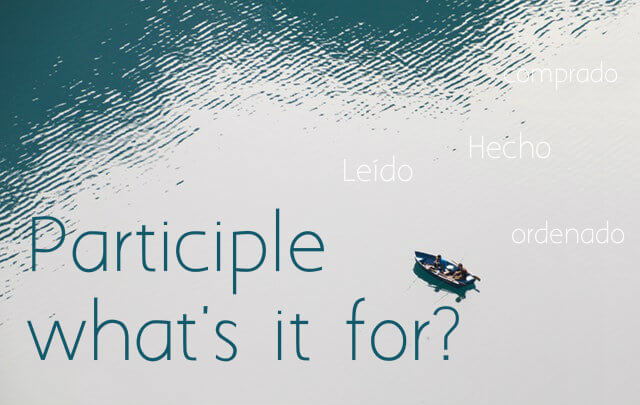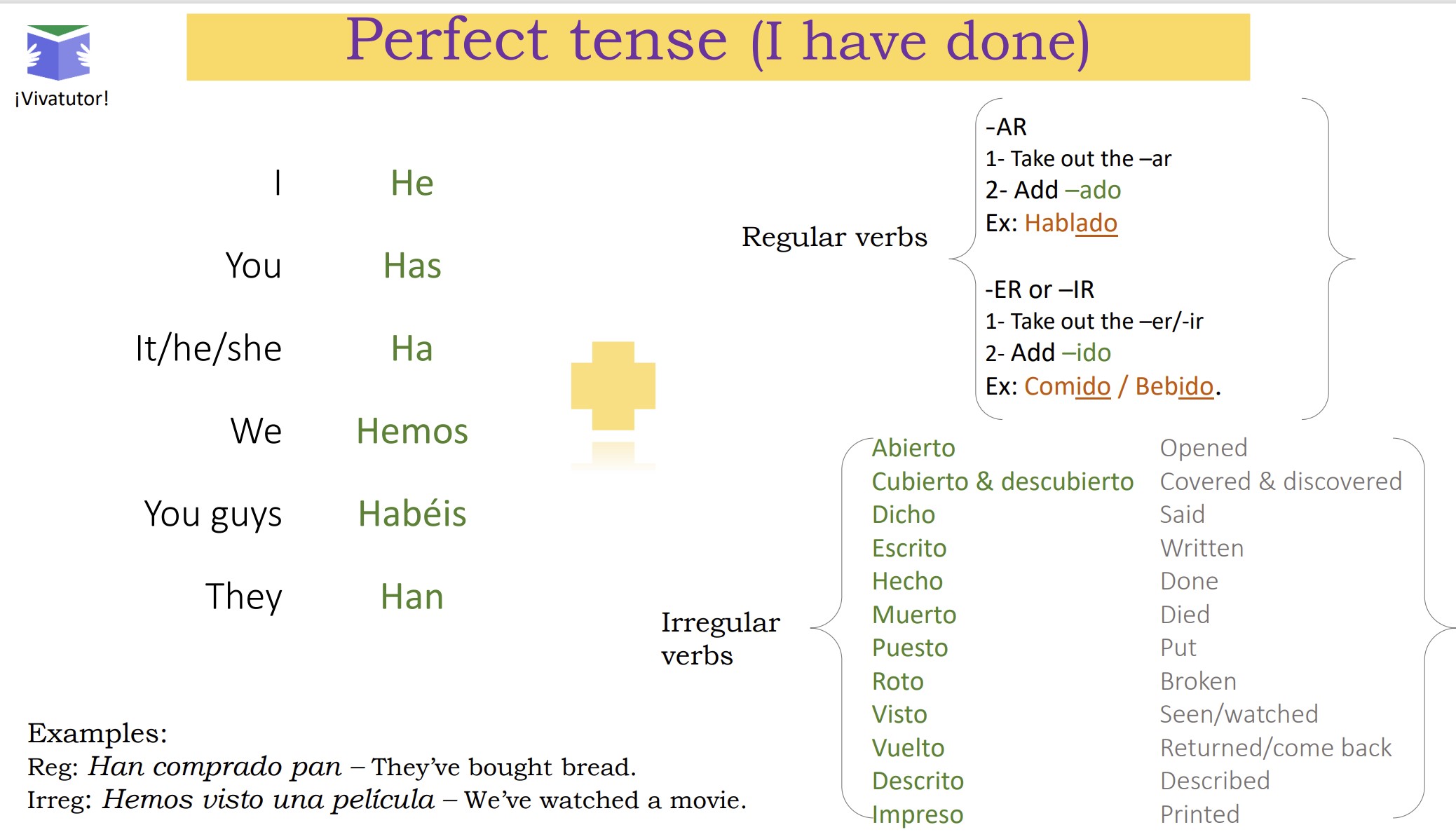Using participle in Spanish

Comido, hablado, dicho, arreglado..., eaten, spoken, said, fixed...
All of these are what we call "participle" or participio in Spanish, and they are the "done" form of the verb.
A few months ago I posted an explanation the difference between infinitive, gerund and participle if you want to check that out before continue reading.
In this post I'm going to go over the same things and add some more, like with passive, as well as specific practice.
Let's list the three possible cases for participle:
Part of a tense - I have done
It's the second part of the perfect tense, past perfect or any other tense formed by "haber" + participle.
In the grid you can see the second part can be regular (ending in -ado/ido) or irregular (you have to learn those):
I included what I thought were the most common irregulars, these are the rest:
Satisfacer (to satisfy) - satisfecho
Resolver (to resolve) - resuelto
These two have a regular and an irregular option:
Freír (to fry) - frito/freído
Imprimir (to print) - impreso/imprimido

Remember, verbs derived from others like "deshacer" from "hacer" have the same irregularity:
Hecho - deshecho
Some examples with "participle" used as part of a tense,with the possible "haber" conjugations.
He comido tostadas hoy - I have eaten toast today.
(Haber in present tense)Él había aprobado el examen ya - He had passed the test already.
(Haber in imperfect)Habríamos ido al cine -We would have gone to the cinema.
(Haber in conditional)Si hubieras hablado conmigo estaríamos bien If you had talked to me we would be alright.
(Haber in imperfect subjunctive)
To understand when to use subjunctive after "if" check this post.Habré acabado mis exámenes en enero I will have finished my exams in January.
(Haber in simple future - never in near future "voy a...")Es esencial que hayas leído las instrucciones primero - It's essential that you have read the instructions first. (Haber in present subjunctive)
Haber also can be conjugated in preterite but it's a very specific and rarer case.
Adjective
The second use for a participle is as an adjective, usually describing a state.
It can be used after a noun: Perros abandonados - Abandoned dogs.
After estar - Estás protegida -You're protected.
after tener (have) - Tengo la planta muy cuidada - I have the plant very taken care for.
after sentirse (feel) - Me siento afortunada - I feel blessed/lucky.
etc
In this case, the participle is going to agree in gender and number with the noun that is describing:
Examples:
Tengo la televisión arreglada - I have tv fixed / my tv is fixed.
(arreglar - to fix)
El piso está terminado - The flat is finished
(terminar - to finish)
Los papeles estaban organizados, la habitación estaba arreglada, pero la ventana estaba abierta -
The papers were organised, the room was tidy but the window was opened.
(organizar, arreglar, abrir-irregular)
Passive voice
Another use for participle is passive:
A sentence in passive has a different order than the usual:
Active sentence: El niño lava el coche - The kid washes the car.
Subject (Person doing the action)+ verb (action) + Direct object (thing/person affected by the action).
Passive sentence: El coche es lavado por el niño - The car is washed by the kid.
The direct object goes at the beginning (and technically becomes the subject) and the person doing the action (the kid) goes at the end.
Sometimes the original subject is not even mentioned. The focus is here what's affected by the action:
El programa fue arreglado - The program was fixed.
(by someone, not mentioned)
The combination here is:
Ser + participle
La televisión fue arreglada - The tv was fixed (by someone)
In this case, the participle agrees with the "thing" affected, just like when it works as an adjective.
Tips to know if a sentence with ado/ido is passive
1- To identify what you see as passive, you can change the order and see if you can rephrase it like I did with the kid and the car.
2- Also, can you add (by someone) at the end?
3- Is it focused on what was done to "x" instead of who did it?
4- Does the participle agree with the subject? Does it have "ser" before it?
Examples:
Passive:
- La película fue grabada - The documentary was filmed.
I could say "by someone", at the end.
I could also change the order: Someone filmed the movie.
Also, the participle "grabada" agrees with "película" (feminine singular)
Finally, there is "ser" before.
Not passive:
- Mis padres estaban enfadados - My parents were angry.
This one agrees but goes with "estar", so it's an adjective. Also I can't say "enfadado" is an action, is a feeling, a state.
Passive:
- Las plantas serán trasplantadas - The plants will be transplanted.
The participle agrees, has "ser" before it, I can say "transplanted by someone" or "someone will transplant the plants". Bingo!
Tricky ones:
- Las imágenes están guardadas - Images are kept.
This is a tricky one because I could have it in passive "son guardadas" - are kept by someone.
But In this case I need to remember that passive is always with "ser", so this cannot be.
It's about the state of the images: they're kept, not forgotten about or lost.
Sometimes when it's tricky to know if you have to use passive or not, the two options are on the table!
Los árboles están podados / Los árboles son podados
The trees are trimmed - describing the state, participle used as adjective.
The trees are trimmed - stating what action is being done to the trees. Someone is trimming them. Participle is not an adjective, is part of passive voice.
Conclusion
Participle can be presented in three ways:
1- Haber conjugated + participle - Haber can be conjugated in a limited set of tenses.
2- Adjective - describing word- After estar, tener, sentirse, ...
3- Ser conjugated + participle - Passive.
Agreement: The only case where participle doesn't agree is when it's part of a compounded tense: I have done, I would have done...
It does agree when it's adjective or part of passive voice.
Practice
Gap fill - choose between the two options. You need to understand participle and the difference between ser and estar too.
If you need help with ser / estar read this post first.
Ya sé que el tesoro ________ (ha sido/ha estado) robado pero no fui yo.
_____ (Tengo/Soy) cerradas todas las puertas
Mi tía Carmen ________ (era / estaba) viviendo en el pueblo cuando su marido murió.
________ (estaba/fui) muy aliviada después de contarte la verdad
La medida ___________ (ha sido/ha estado) prohibida durante siglos. La ley_______ (fue /estuvo) abolida por Enrique III en 1140.
Yo nunca _____ (había/fui) ido a Marruecos hasta ahora
Los policías ____________(fueron / estuvieron) premiados por su valentía.
El cerebro ____________ (ha sido / ha estado) estudiado numerosas veces en la historia.
Sol: hasido/tengo/estaba/estaba/haestado/fue/había/fueron/hasido
¡Hasta pronto! ¡Ha sido un placer! :)